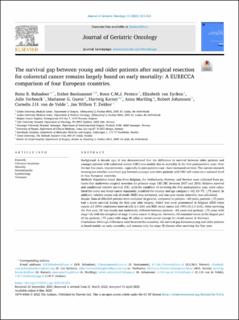| dc.contributor.author | Bahadoer, Renu R. | |
| dc.contributor.author | Bastiaannet, Esther | |
| dc.contributor.author | Peeters, Koen C.M.J. | |
| dc.contributor.author | van Eycken, Elizabeth | |
| dc.contributor.author | Verbeeck, Julie | |
| dc.contributor.author | Guren, Marianne | |
| dc.contributor.author | Kørner, Hartwig | |
| dc.contributor.author | Martling, Anna | |
| dc.contributor.author | Johansson, Robert | |
| dc.contributor.author | van de Velde, Cornelis J.H. | |
| dc.contributor.author | Dekker, Jan Willem T. | |
| dc.date.accessioned | 2022-11-29T14:52:08Z | |
| dc.date.available | 2022-11-29T14:52:08Z | |
| dc.date.created | 2022-10-17T10:51:51Z | |
| dc.date.issued | 2022 | |
| dc.identifier.issn | 1879-4068 | |
| dc.identifier.uri | https://hdl.handle.net/11250/3034816 | |
| dc.description.abstract | Background: A decade ago, it was demonstrated that the difference in survival between older patients and younger patients with colorectal cancer (CRC) was mainly due to mortality in the first postoperative year. Over the last few years, improvements - especially in perioperative care - have increased survival. The current research investigates whether a survival gap between younger and older patients with CRC still exists on a national level in four European countries.
Methods: Population-based data from Belgium, the Netherlands, Norway, and Sweden were collected from patients that underwent surgical resection for primary stage I-III CRC between 2007 and 2016. Relative survival and conditional relative survival (CS), with the condition of surviving the first postoperative year, were calculated for colon and rectal cancer separately, stratified for country and age category (<65, 65–75, ≥75 years). In addition, relative excess risk of death (RER) was estimated, and one-year excess mortality was calculated.
Results: Data of 206,024 patients were analyzed. In general, compared to patients <65 years, patients ≥75 years had a worse survival during the first year after surgery, which was most pronounced in Belgium (RER colon cancer 2.5 [95% confidence interval (CI) 2.3–2.8] and RER rectal cancer 2.6 [95% CI 2.3–2.9]). After surviving the first year, CS was mostly not statistically different between patients <65 years and patients ≥75 years with stage I-II, with the exception of stage II colon cancer in Belgium. However, CS remained worse in the largest part of the patients ≥75 years with stage III colon or rectal cancer (except for rectal cancer in Norway).
Conclusions: Although differences exist between the countries, the survival gap between young and older patients is based mainly on early mortality and remains only for stage III disease after surviving the first year. | en_US |
| dc.language.iso | eng | en_US |
| dc.publisher | Elsevier | en_US |
| dc.rights | Navngivelse 4.0 Internasjonal | * |
| dc.rights.uri | http://creativecommons.org/licenses/by/4.0/deed.no | * |
| dc.title | The survival gap between young and older patients after surgical resection for colorectal cancer remains largely based on early mortality: A EURECCA comparison of four European countries. | en_US |
| dc.type | Journal article | en_US |
| dc.type | Peer reviewed | en_US |
| dc.description.version | publishedVersion | en_US |
| dc.rights.holder | Copyright 2022 the authors | en_US |
| cristin.ispublished | true | |
| cristin.fulltext | original | |
| cristin.qualitycode | 1 | |
| dc.identifier.doi | 10.1016/j.jgo.2022.04.011 | |
| dc.identifier.cristin | 2061908 | |
| dc.source.journal | Journal of Geriatric Oncology | en_US |
| dc.source.pagenumber | 803-812 | en_US |
| dc.identifier.citation | Journal of Geriatric Oncology. 2022, 13 (6), 803-812. | en_US |
| dc.source.volume | 13 | en_US |
| dc.source.issue | 6 | en_US |

